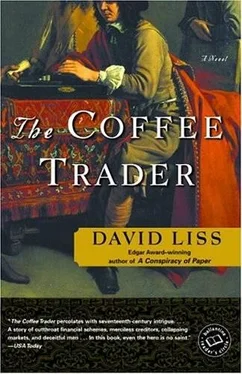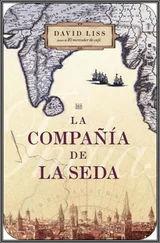A natural leader of men, my father attracted to him others who made their living through countless deceptive and curious entertainments. He commanded an army of cardsharps and dice cheats, fire-eaters and blade swallowers. Those who could earn a living simply by displaying the shapes with which nature had burdened them also rallied to my father’s banner. Among my earliest childhood companions were dwarfs and giants, the monstrously fat and the horrifically gaunt. I played games with the snake boy and the goat girl. As I grew older I developed an unhealthy curiosity about a person my father knew who had the anatomy of both a man and a woman. For a few coins, this unfortunate would allow anyone to watch it fornicate with itself.
When I was but ten years of age my father received a late-night visit from an older boy, Miguel Lienzo, whom I recognized from synagogue worship. He was a roguish fellow, as much drawn to my father’s company of tricksters and oddities as he was to my father’s learning. I say he was roguish, for he loved always to defy one authority or another, and in the time I knew him in Lisbon those authorities he loved defying most were his own family and the Inquisition itself.
This Lienzo came from a line of relatively sincere New Christians. There was no shortage of these: men who, out of either genuine belief or merely a desire to avoid persecution, conformed entirely to the Christian way and shunned those of us who sought to live as Jews. Lienzo’s father was a successful trader and had, in his opinion, too much to risk the ire of the Inquisition. Perhaps for this reason alone, Miguel came eagerly to our secret prayer meetings and struggled to learn what my father could teach him.
More than that, young Miguel used his father’s connections with the Old Christian community to learn what he could of the Inquisition. He had a keen ear for rumor, and he delighted in providing warnings where he could. I knew of a half dozen families who had fled the night before the Inquisitors pounded on their doors-all because Lienzo had known where to lurk and listen. I believe he did these great deeds both from a desire to see justice done in the world and for the pleasure of treading where he had no business. Years later, when I saw him again in Amsterdam, he never recognized me or even remembered what he had done for my family. I have never forgotten his kindness, though some have insisted otherwise.
Miguel came to warn us after he had volunteered to help our priest scrub his private chambers in the church (he always volunteered for these thankless tasks in the hopes of gaining some intelligence) and had then chanced to hear a conversation between that wretch and an Inquisitor who had developed an interest in my father.
And so, in the dark of night, we left the only home I had known, taking many of our friends with us. We were Jew and Christian and Moor and Gypsy all, and we traveled to more cities than I can now enumerate. For years we lived in the East, and I was fortunate to spend many months in the holy city of Jerusalem. It is but a shadow of its former glory, but there were times in my unfortunate life when the memory of those days, of walking the streets of my nation’s ancient capital, visiting the place where the holy Temple once stood, have sustained me when I could find meaning in nothing else. If it be the will of the Holy One, blessed be He, I shall return sometime to that sacred place and live out my remaining days there.
In our travels we also traversed Europe, and we were in London when my father died of a brain fever. I was then five-and-twenty, grown to a man but not a man of my father’s disposition. My younger brother, Mateo, wanted to take command of the army of outcasts, and I knew he had the character to lead them. Though I had wandered for years, I was not myself a wanderer. I could perform card cheats and dice tricks, but not half so well as Mateo. I could get a dog to do nothing but show me its belly and a cat to do nothing but knead upon my lap. My father had always spoken of the importance of Jews to live as Jews and among Jews, and I recalled from a visit to Amsterdam some years earlier that in that city Jews enjoyed a degree of freedom unrivaled in the rest of Christendom.
So I crossed the North Sea and found myself embraced by the large community of Portuguese Jews who lived there. I was, at any rate, embraced at first. And that is why I write this memoir. I wish to make clear why I was unjustly exiled from a people I loved. I wish to tell the world that I am not the villain it thinks me. And I wish to set on paper the true facts regarding Miguel Lienzo and his dealings in the coffee trade, having been much blamed in that sphere, and blamed very unfairly too. It is my intention to describe my doings in Amsterdam, the conditions of my excommunication, my life in that city afterward, and precisely what role I played in Lienzo’s affairs.
It is true that before I knew how to walk I could hide a card in my clothes and make the dice roll the way I wished, but I vow to practice no trickery in these pages. I will be like the Bear Man, a petulant fellow with whom I traveled for years. I will disrobe to show you nature’s truth. If you like, reader, you may even pull on the fur to see that it is no deception.
Geertruid could never understand the difficulty Miguel faced in doing business with her. She might smile sympathetically when he spoke of his fears, but in the end she almost certainly believed his resistance was some willful Hebrew eccentricity, like not eating squid or refusing to talk business on Saturday day, but being happy to talk on Saturday night.
Miguel hated that she should think him foolish or stubborn. When he would violate some small law or other-drink impure wine or labor, just a little, on the Sabbath-she would ask how he could do these things and still purport to care so much for his observance. He did not know how to explain that no one but a tsadik -a saint-could hope to obey all the laws; it was the effort that brought a man closer to the Holy One, blessed be He.
Though he had told her about his past, Geertruid still had no understanding of what it had been like to live as a Secret Jew in Lisbon, with only a vague notion of who he truly was. If it was so truly terrible, she would ask, why do any of you Jews remain?
Why indeed? Because it was where they had always lived, for hundreds of years. Because their families were there, their businesses. Some stayed because they had no money, others because they had too much. The stories of freedom to worship in Amsterdam or in the East sounded as elusive as the coming of the Messiah.
Many New Christians embraced Catholicism with a slavish fervor, and Miguel’s father had been such a man. Not that he believed deeply, but he believed deeply in convincing the world of his sincerity with his regular church attendance, his public denouncement of Jewish “superstition,” his donations to the Church. New Christians, sincere or not, lived in a single community, and Miguel’s father wanted his sons to stay away from the backsliders. “My grandparents chose to convert rather than be exiled,” he had explained, “and I’ll not dishonor their choice.”
Perhaps for the pleasure of defying his father, perhaps because it was dangerous, Miguel had begun secretly attending study groups when he was still a boy. The older men there encouraged him, made him feel special with their praise, and let him know without words that they too thought his father a great boor. Miguel had loved the feeling of being included in something larger than himself and of doing something wicked that was, at the same time, righteous.
Miguel’s younger brother, Daniel, understood this division between father and son and exploited it, showing his father every day in a dozen ways that he was not one of those horrible backsliders who brought nothing but woe to their community. Their father was inclined to favor Daniel at any rate, since he looked far more like his side of the family. Miguel bore a striking resemblance to his mother’s father. Daniel had always been thin, like the elder Lienzo, all hard angles and sharp corners, eyes too large for his face, hands too small for his body. Miguel took after his mother’s side-meaty men who commanded attention, just the sort of man the elder Lienzo had always despised.
Читать дальше












